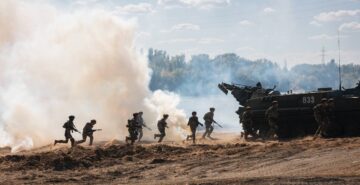

“Artek” in the TOT: From Recreation Camp to Propaganda Machine
Summer is traditionally associated with the start of school holidays and a time for rest. It is during this season that health and recreation sessions begin in children’s camps. One such iconic place was “Artek” – a camp on the Crimean Peninsula that, for many generations, symbolised a longed-for summer retreat.
In June 2025, “Artek” marked its 100th anniversary. However, this milestone is not only an occasion for celebration – it also serves as a reminder of Russia’s unlawful seizure of the “Artek” centre following the occupation of the AR of Crimea.
On the temporarily occupied territories of Ukraine (hereinafter – TOT), the summer children’s health and recreation campaign has been transformed into yet another tool of propaganda, militarisation, and the eradication of Ukrainian identity.
It is the Crimean “Artek” centre and its branches that have become a key link in the system of child indoctrination Russia is building on the seized territories. Today, the camp effectively serves as a tool in the ideological war against Ukraine. The history of this camp and what is happening there now are explored further in this article.
From a Russian Red Cross Sanatorium to a Pioneer Camp
“Artek” was founded on 16 June 1925, when the first session of the sanatorium camp run by the Red Cross Society of the Russian Soviet Federative Socialist Republic opened near Gurzuf, on the southern coast of Crimea. From the very beginning and roughly until the end of the Second World War, the camp’s activities were focused on medical care and rehabilitation. Children with tuberculosis or those at risk of developing it were sent to “Artek”. The first session hosted 80 children from Moscow, Ivanovo, and Crimea, who lived in canvas tents. In total, the camp welcomed 320 children over four summer sessions in 1925. Just two years later, lightweight plywood cabins were built on the shore. By 1969, “Artek” had grown to include 150 buildings, three medical centres, a school, the “Artekfilm” studio, three swimming pools, a 7,000-seat stadium, and children’s playgrounds.
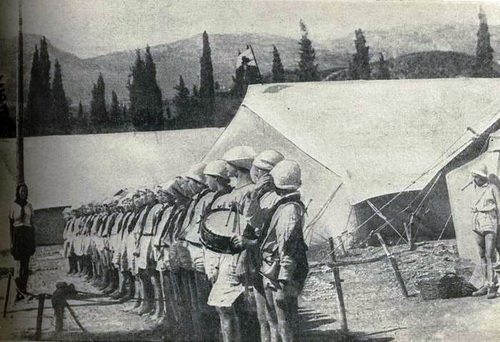

Source: https://archive.ph/20150324131614/http://www.artek.org/History%20Artek/history%20/#selection-1327.168-1331.3
Over time, “Artek” was transformed into a model Pioneer camp, where children’s health and recreation were combined with patriotic and ideological education. A place at “Artek” became a reward for exemplary Pioneer members.
The period from 1991 to 2014 (prior to the occupation of the AR of Crimea)
After the collapse of the USSR, “Artek” came under the jurisdiction of an independent Ukraine. However, for a long time, it faced financial difficulties and organisational challenges. During these years, efforts were made to update the camp and adapt it to new realities: themed sessions were introduced, and international partners were engaged. One successful initiative was an exchange programme with schools in the United States, which in 1996 evolved into an International Teachers’ Competition. This allowed “Artek” to become a pedagogical hub for innovative educators from 13 countries over the following seven years. In 2006, the State Enterprise of Ukraine International Children’s Centre “Artek” was granted the status of a Category 2 Centre under the auspices of UNESCO.
Russian children continued to spend their holidays at “Artek”, and the camp remained popular among Russians even after Ukraine declared independence. Moreover, before the occupation of the AR of Crimea, “Artek” was visited several times by Vladimir Putin, including in 2001 and 2004. Together with then-President of Ukraine Leonid Kuchma, he met with children, including those affected by the Beslan tragedy.
Note: In September 2004, during a hostage crisis at a school in the town of Beslan (North Ossetia, Russian Federation), more than 300 people were killed, including 186 children. In 2017, the European Court of Human Rights, in the case of Tagayeva and Others v. Russia, ruled that the Russian state had violated the right to life by failing to take appropriate preventive measures to avert the Beslan terrorist attack and by using disproportionate force during the storming of the school, which led to numerous casualties among the hostages, including children.
During one of his visits, Putin presented the library of “Artek” with collections of works by children’s authors, including Pushkin. This was not merely a gesture of “cultural generosity”, but rather an attempt to symbolically mark the space as Russian through literary references.
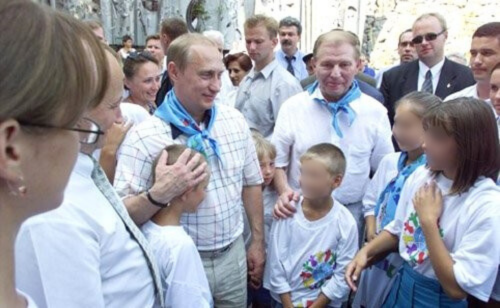

Source: http://www.kremlin.ru/events/president/news/42164/photos, archive https://archive.ph/wip/vizlX
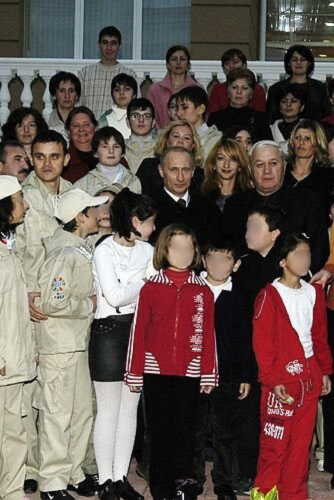

Source: http://kremlin.ru/events/president/news/32138, archive: https://archive.ph/wip/q2CTT
Occupation: Crimean “Artek” as a Platform for Indoctrination and Militarisation of Children
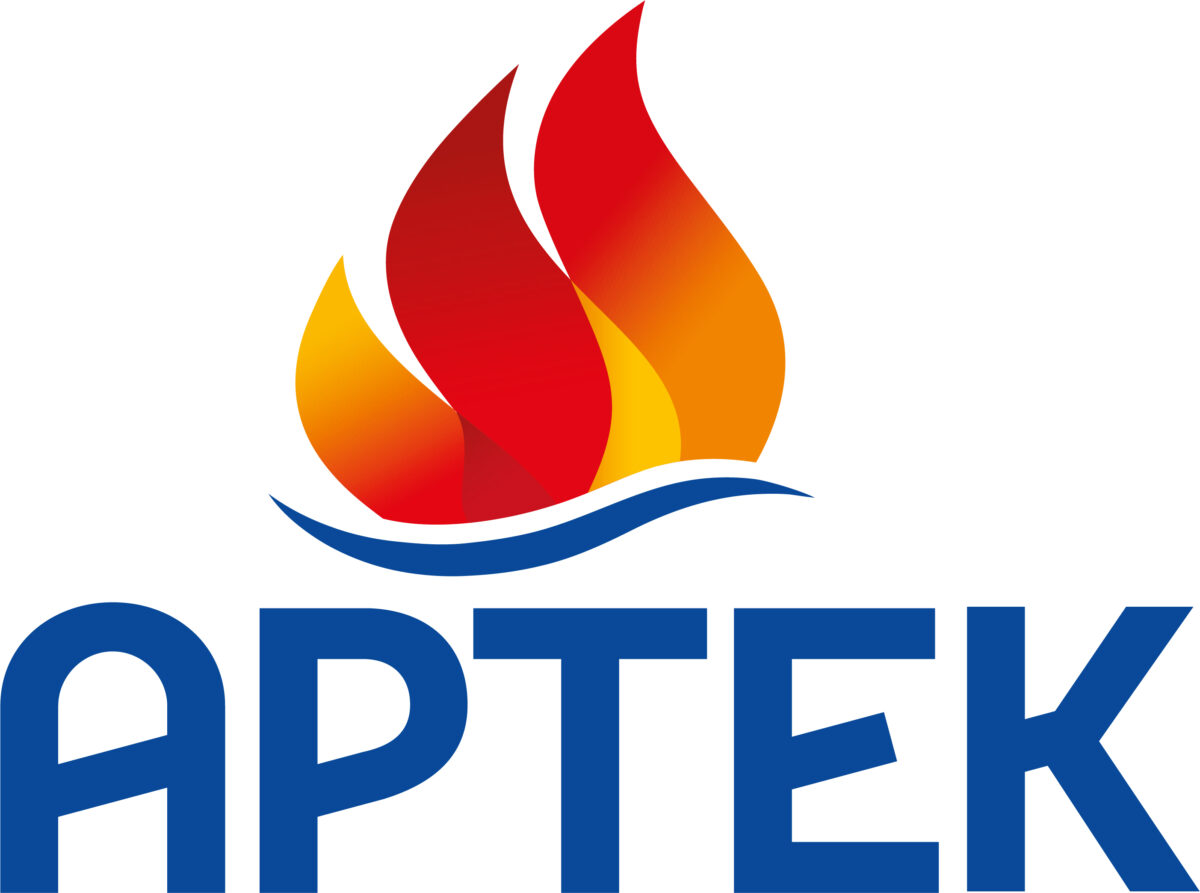

Source: https://artek.org/ob-arteke/logotip-i-rekvizity, archive: https://archive.ph/wip/iaDmj
After the occupation of Crimea in 2014, Russia unlawfully seized the territory, brand, and property of the State Enterprise of Ukraine International Children’s Centre “Artek”. In June 2014, it established the Federal Budgetary Institution “International Children’s Centre ‘Artek’” (abbreviated as ICC “Artek”*) on its basis.
*As of today, the full name of the camp is the Federal State Budgetary Educational Institution “International Children’s Centre ‘Artek’”
In 2015, the so-called “Council of Ministers of the Republic of Crimea” transferred the “Artek” centre from the “state property of the Republic of Crimea” into the federal ownership of the Russian Federation. In response to this unlawful Russian policy in the TOT of the AR of Crimea, the Ministry of Foreign Affairs of Ukraine issued a statement calling on “UNESCO, leading international organisations, and the global community to condemn such actions by the Russian side, which represent a challenge to the entire civilised world, to intensify international pressure on Russia with the aim of returning it immediately to the framework of international law, reversing all unlawful decisions that have led to the temporary occupation of Ukrainian territory, and providing compensation for the damage caused to Ukraine and its citizens”.
However, Ukraine has not yet succeeded in restoring control over “Artek” in the TOT of the AR of Crimea. As a result, the State Enterprise of Ukraine International Children’s Centre “Artek” was relocated to Kyiv Oblast, where the children’s camp resumed its activities in 2016. A branch was later opened in Zakarpattia Region. According to its leadership, the priority of State Enterprise of Ukraine International Children’s Centre “Artek” is to support children from vulnerable social groups.
As for “Artek” in the TOT of the AR of Crimea, it has been transformed from a children’s holiday centre into a tool for promoting Russian ideology, where militarised and propagandistic projects are implemented. One such initiative is “We Are Citizens of Russia”, organised by the “Movement of the First”, under which teenagers are “ceremonially” presented with their first Russian Federation passports. In particular, in May 2025, children from the TOT of the AR of Crimea and Luhansk Region received such documents.
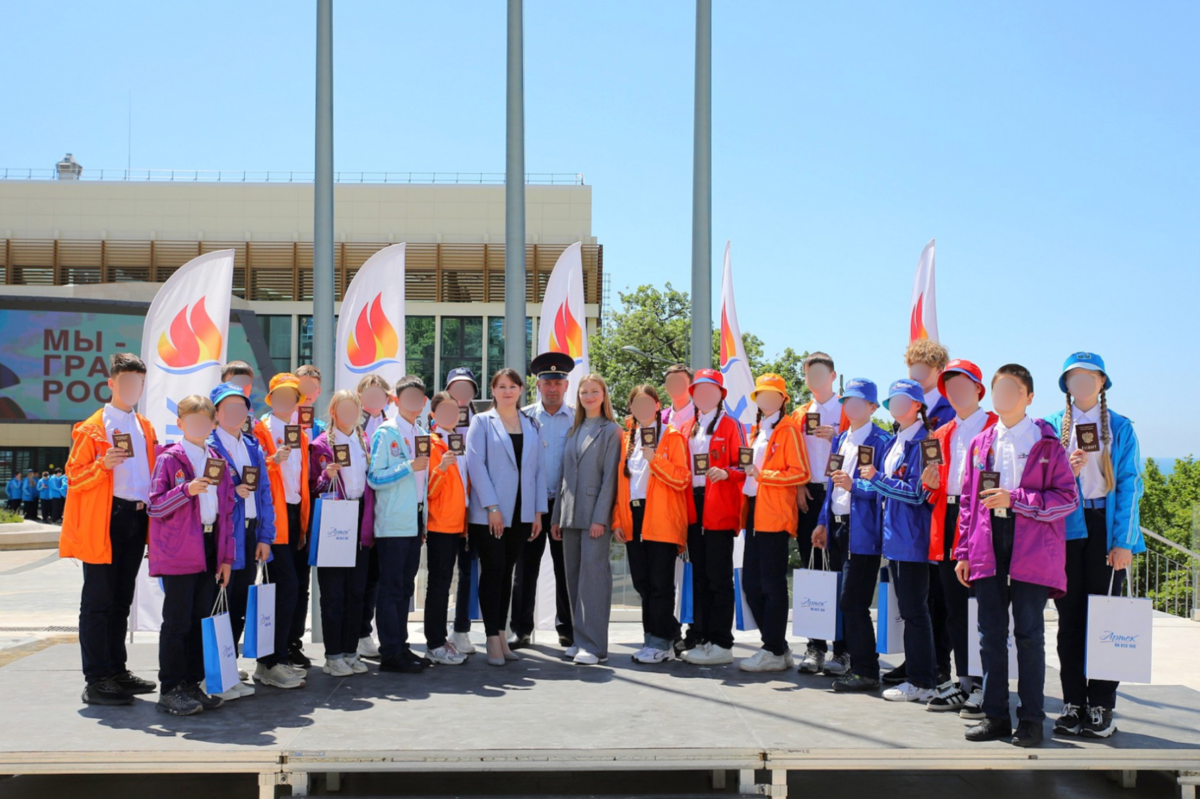

Source: https://artek.org/news/medianews_2025_05_15_5, archive: https://archive.ph/wip/v4hPe
In an interview with Radio Svoboda, historian Professor Matthias Neumann stated that the Russia-controlled “Artek” served “both as a showcase of Russian revival and a bridge to the Soviet past”, with the aim of “shaping young minds, promoting a state-sanctioned vision of history, and cultivating loyalty to the Russian state”.
Today, “Artek” in the TOT of the AR of Crimea operates year-round, with nine camps located on its premises. Each summer session hosts over 3,000 children, while winter sessions accommodate more than 1,500. It also has three branches: 1) the ICC “Artek” hotel base in occupied Simferopol, 2) the children’s centre “Korsun” in the TOT of Sevastopol, and 3) the children’s health centre “Red Carnation” (“Krasnaya Gvozdika”) in occupied Berdyansk.
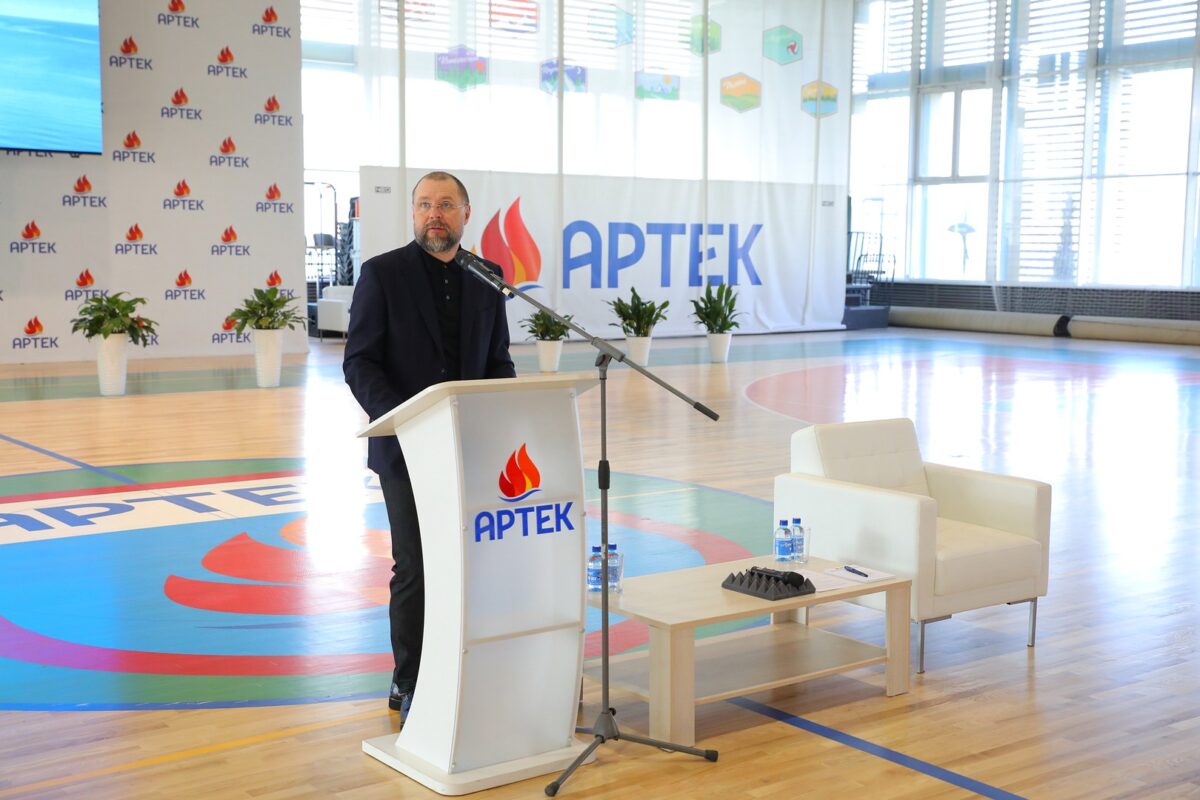

Source: https://artek.org/news/medianews_2025_04_10_1?ysclid=mcive6acs4854556016,
archive: https://archive.ph/wip/3Rdol
Since 2018, the camp has been headed by Konstantin Fedorenko, born in 1976 in the city of Belorechensk, Krasnodar Krai, Russian Federation. He held senior positions in the regional government of Krasnodar Krai, including Acting Minister of Education, Science and Youth Policy, and later Minister of Labour and Social Development. In November 2018, he began working at ICC “Artek” (TOT of the AR of Crimea) as Deputy Director for Construction. In February 2019, he became Acting Director, and in October of the same year, he officially assumed the role of Director of the Centre, having been appointed directly by the government of the Russian Federation.
Fedorenko emphasises that “Artek” places particular focus on patriotic education (note – pro-Russian). According to him, the role of the camp’s educators is to “establish a unified conceptual space and offer children guiding principles for developing their worldview, the central one being: we take pride in our past and in the heroism of our ancestors”. Under his leadership, “Artek” in the TOT of the AR of Crimea has been fully transformed into a hub of Russian propaganda, where ideological indoctrination of children (including those from the TOT) is combined with militarisation and the promotion of loyalty to the Russian authorities and military.According to open sources, from 2023 to October 2024, at least 3,169 children from the TOT of Donetsk, Luhansk, Zaporizhzhia and Kherson regions spent time at the “Artek” centre (TOT of the AR of Crimea), including 863 children in 2024 alone. In 2025, a further 2,000 children from the so-called “new regions” are expected to take part in the camp’s recreation programme.
Forcible transfer of Ukrainian children
Following Russia’s full-scale invasion in 2022, “Artek” and several other camps in occupied Crimea became locations for the so-called “evacuation” of children (as described by representatives of the Russian authorities). In reality, this constituted the forcible transfer of children from Ukrainian territory occupied by Russia. The camp has openly acknowledged the presence of children from the TOT in 2022, presenting it as part of a “recreation and health” programme. For example, in July 2022, 110 children from the TOT of Kherson and Zaporizhzhia regions arrived at “Artek”.
Often, following such trips, children do not return to Ukraine. They are not handed back to their parents or legal guardians – instead, they are transferred to the state institutions for children in the Russian Federation, placed under guardianship in Russian families, or even adopted.
The OSCE report on the deportation of Ukrainian children by Russian forces states that, by transferring children from Ukraine, Russia committed a war crime. The report also notes that these deportations may qualify as crimes against humanity. Furthermore, it highlights that after being abducted and removed from Ukraine, the children are “exposed to pro-Russian information campaigns”, which frequently amount to what is described as “comprehensive re-education”.
For this unlawful activity, as well as for involvement in the system of re-educating children from the TOT, “Artek” and its director, K. Fedorenko, have been subjected to international and Ukrainian sanctions.
Centennial of “Artek”: A Tool of Russian Propaganda in Occupied Crimea
Russia began preparing for the centennial of “Artek” well in advance, aiming to use the occasion to further its propaganda narratives. As early as November 2022, Putin signed a corresponding decree, and in April 2023, a federal organising committee was established. Its members included Dmitry Chernyshenko, Deputy Chairman of the Government of the Russian Federation; Sergey Kravtsov Minister of Education; Elena Romanovskaya, the so-called “Minister of Labour and Social Protection of the Republic of Crimea”; Tikhon (Georgiy Shevkunov), Metropolitan of Simferopol and Crimea and head of the religious organisation “Patriarchal Council for Culture of the Russian Orthodox Church” (by consent); Konstantin Fedorenko, director of “Artek”; and others. In addition, a separate organising committee was set up on the TOT of the AR of Crimea, headed by Sergey Aksyonov, the so-called “Head of the Republic of Crimea”. Its task was to oversee local celebrations and ensure extensive media coverage.
Plans were also approved at the federal and regional levels, along with an internal plan for the camp itself. All 15 sessions in 2025 have been given anniversary status and are expected to bring together nearly 45,000 children – including those from the TOT.
At a press conference announcing the programme of events for the camp’s centenary, Konstantin Fedorenko emphasised that the centre had become “an unquestionable symbol of the Russian state’s care for children”. In total, 100 nationwide events are planned for 2025 to mark the anniversary. On 17 March, schools and colleges across the Russian Federation, including those in the TOT, held the “Conversations about Important Things” session themed around the centenary of “Artek”. As part of the celebrations, a rocket bearing the camp’s emblem was launched from the Baikonur Cosmodrome. This gesture highlights that for the Kremlin regime, “Artek” is not merely a children’s centre but one of the key instruments of state propaganda – a symbol of the “great Russia”.
“One Hundred Years Along the Road of Childhood” was the anniversary session held from 28–29 May to 17–18 June 2025, accompanied by a series of large-scale events aimed at ideological indoctrination, the glorification of Russia’s military history, and the celebration of the “achievements” of the occupying state. Among the events were: Day of the Firsts; activities marking the 80th anniversary of the “Great Victory”, including remembrance ceremonies at “Artek” and in Sevastopol; participation in the project “No Statute of Limitations”; celebrations of Russia Day (ceremonial assemblies under the slogan “Russia Begins With Me”; the campaign “We Are Citizens of Russia”; events marking Pushkin Day; and the festive programme “Artek at 100%”.
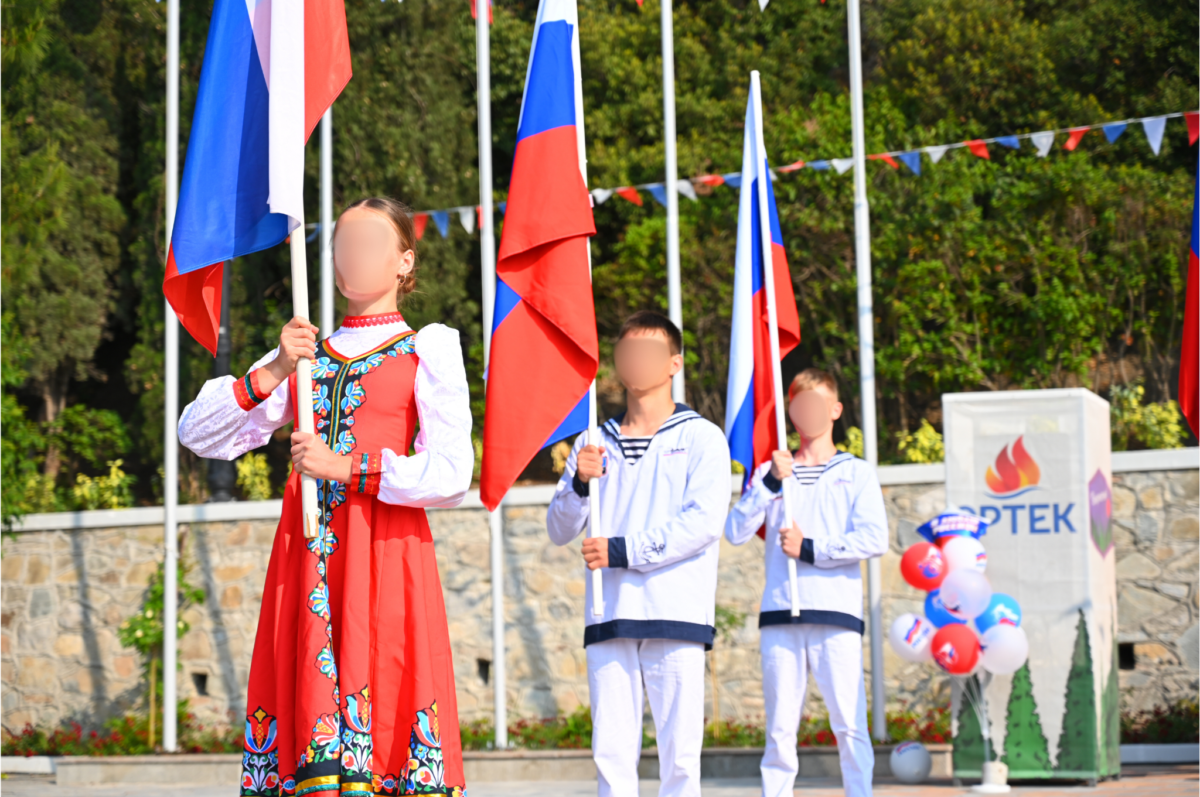

Archive: https://archive.ph/wip/uPwRf
As part of the anniversary session, a “Lesson in Courage” was held with Yuriy Nimchenko – a participant in the so-called “SMO”, now a Russian Federation senator representing occupied Crimea and a Hero of Russia. Events like these are designed to present the “heroism” of Russian soldiers as a role model for teenagers.
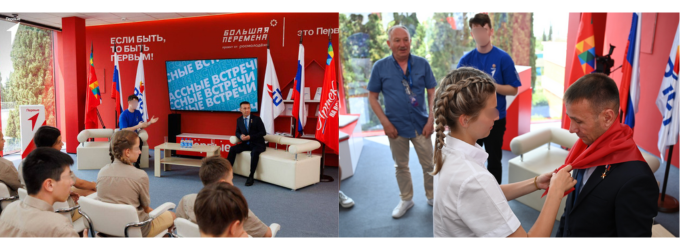

Sources: https://t.me/mypervie82/8606, archive: https://archive.ph/hJF20; https://vk.com/wall-9400288_516108, archive: https://archive.ph/wip/ij1uf
Similar meetings with Russian military personnel who have fought against Ukraine are held regularly at the centre. Over the past few years, the programmes of various sessions have included special forces officers, marines, police officers, and representatives of the Russian National Guard. They not only give lectures to the children but also present awards, conduct drill training, and organise other military instruction activities. Regardless of the session’s stated focus, such events are aimed at glorifying Russia’s war against Ukraine. Teenagers are gradually conditioned to view military service as the highest form of civic duty, and armed aggression as just and necessary.
Today, “Artek” works closely with “Young Army” and the “Movement of the First”, along with their regional branches in the TOT of the AR of Crimea and Sevastopol, the Russian Ministry of Defence, other security agencies, and state institutions. Teenagers are taught the basics of military affairs, take part in militarised games and programmes such as “Eyes on the Flag!” run by the Crimean branch of DOSAAF Russia, and “School of Future Commanders”, organised by an autonomous non-profit organization of the same name led by Vladimir Kovalenko (head of the Sevastopol branch of “Young Army”). The involvement of children in these activities effectively amounts to preparing them for service in the Russian armed forces – instead of recreation, teenagers are immersed in a militarised environment.
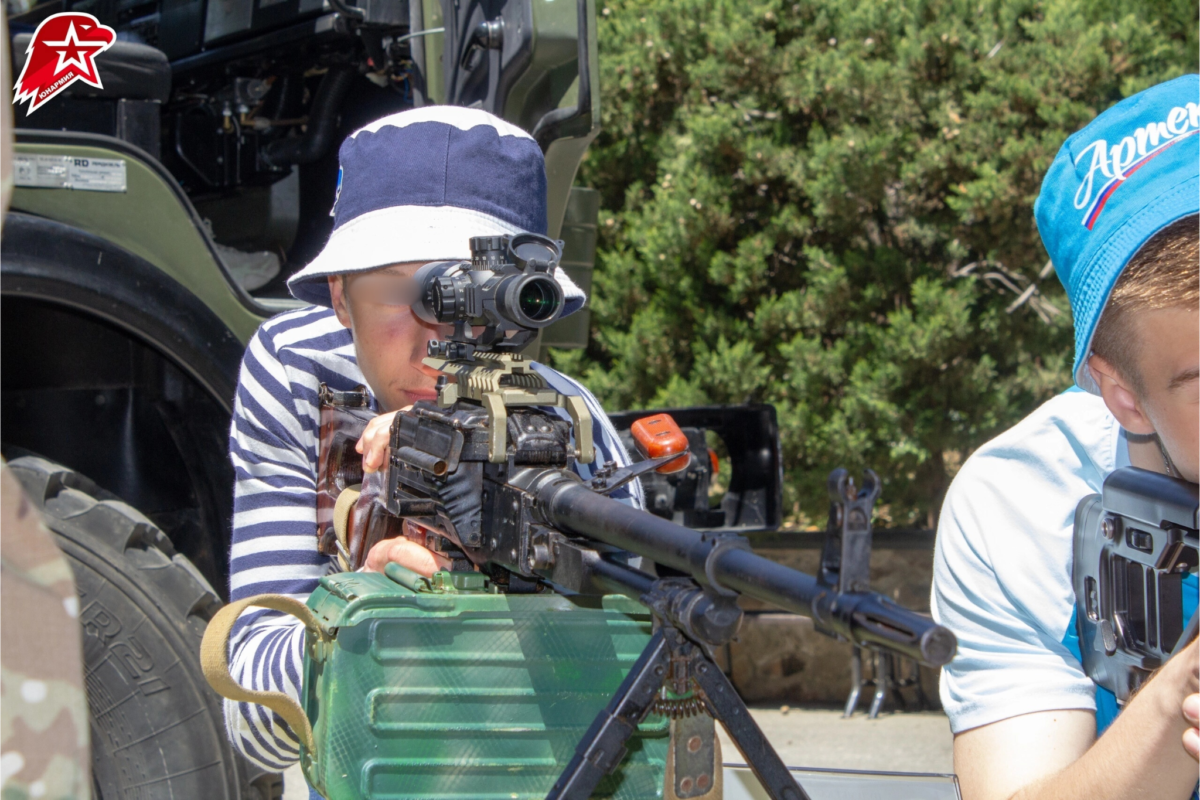

Source: https://vk.com/wall-122681115_8646 , archive: https://archive.ph/wip/rs4wx
Unlawful branch of “Artek” in occupied Berdiansk
In June 2024, an unlawfully established branch of “Artek” was opened in occupied Berdiansk – the children’s centre “Red Carnation” (“Krasnaya Gvozdika”). The centre was headed by Liliya Shvetsova, who continues to serve as its director. The first session was “officially” launched on 1 June 2024 by the director of “Artek” (TOT of the AR of Crimea), Konstantin Fedorenko, who expressed gratitude for the support of Vladimir Putin, the Ministry of Education of the Russian Federation, and the so-called “Governor of Zaporizhzhia Oblast”.
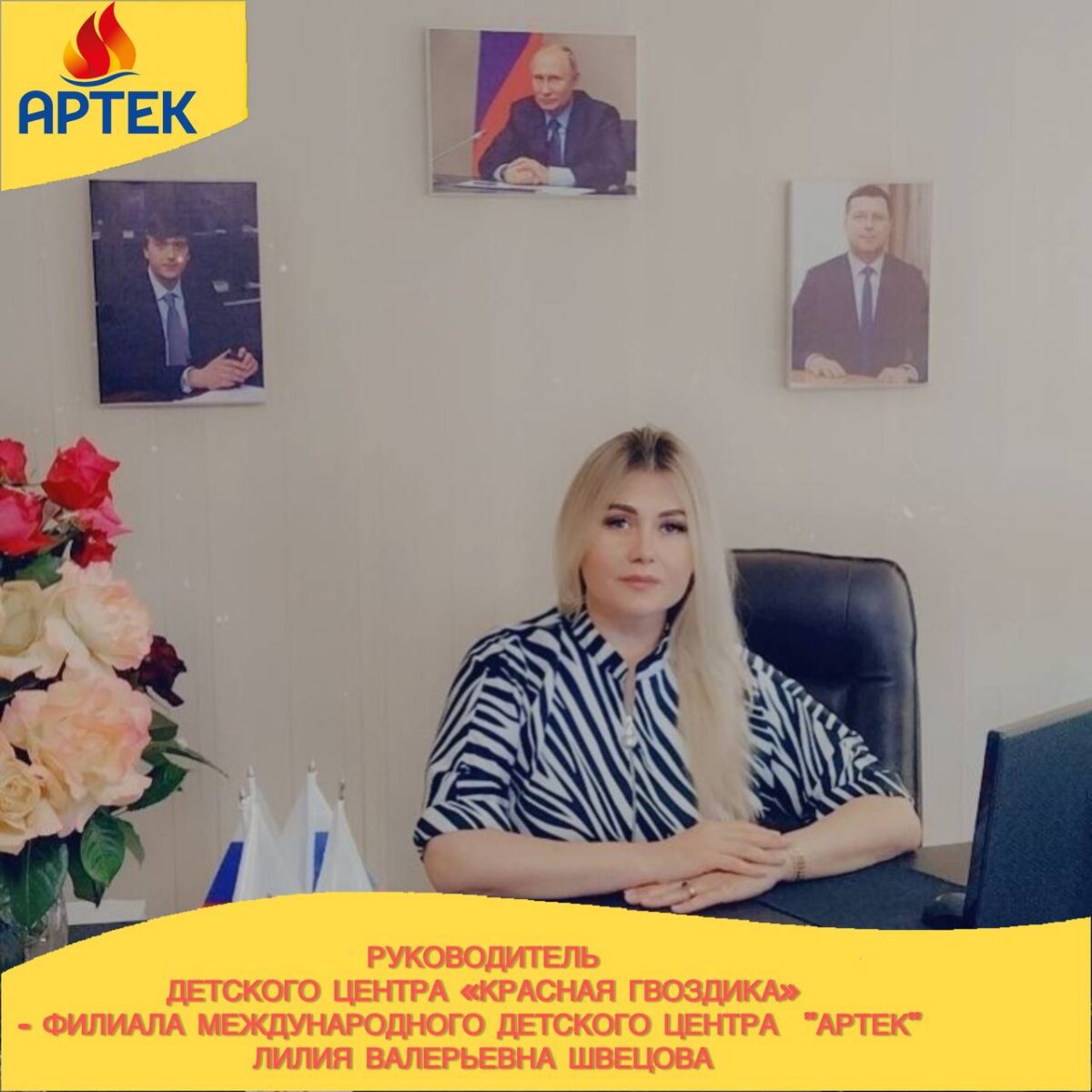

During its first season, the centre hosted over 1,000 children from the TOT of Donetsk, Luhansk, Kherson and Zaporizhzhia regions. In 2025, attendance is expected to rise, with more than 1,500 children from the TOT anticipated to attend the camp.
Under the guise of “recreation”, children undergo intensive ideological and military-patriotic training. In particular, the camp implements an educational programme by the “Znaniye” (“Knowledge”) society, which includes lectures on spiritual and moral values and pro-Russian patriotism. The programme is thematically linked to key ideological dates in the Russian Federation in 2025: the 80th anniversary of the victory in the so-called “Great Patriotic War”, the anniversary of the nuclear industry, and the “Year of the Defender of the Fatherland”. More than 150 children from TOT have taken part in the programme.
“Red Carnation” actively cooperates with Russian youth movements. A local branch of the “Movement of the First” has been established at the camp, and in 2025, a cooperation agreement was signed with the regional branch of “Young Army”. The camp’s director, Liliya Shvetsova, announced that each session in 2025 will include patriotic events, as she considers “Young Army” to be a tool for the spiritual, moral, and military-patriotic education of children. Meanwhile, the head of the “Young Army” headquarters in the TOT of Zaporizhzhia region, Fidail Bikbulatov, reported plans to begin holding regular “Young Army”-themed sessions at the children’s centre starting next year, as well as prospects for launching the “School of Future Commanders” project directly in Zaporizhzhia Oblast (TOT).
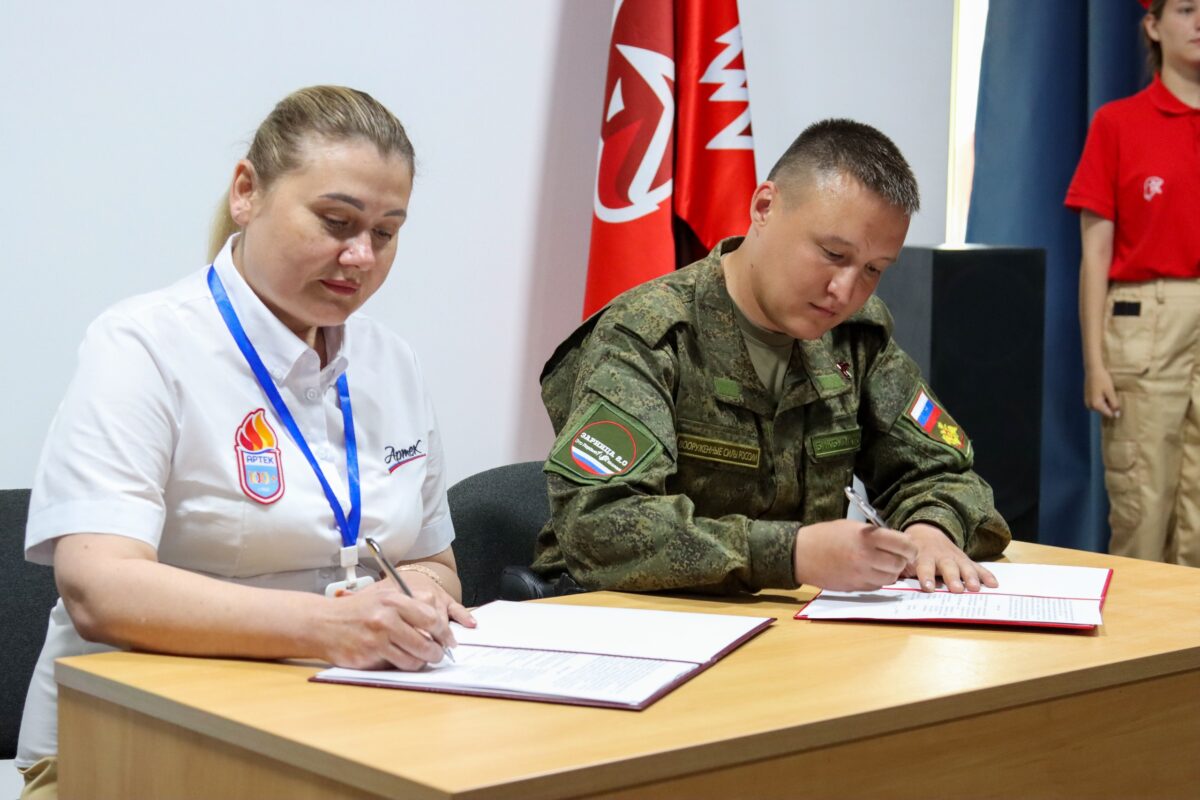

Children’s centres such as “Artek” in occupied Crimea and “Red Carnation” in the TOT of Zaporizhzhia region serve as tools for fostering loyalty and allegiance to Russia – places where “education and recreation” are used to militarise and indoctrinate children, including those from TOT. Today, in the context of war, occupation, and cultural resistance, the issue is particularly urgent: how easily re-education in the interests of the occupying state can be carried out under the guise of “children’s recreation”. And how vital it is to defend not only territory, but the very idea of a childhood free from coercion, fear, and propaganda.
Article prepared by the Almenda Center for Civic Education as part of the project “Defending childhood: justice & reintegration for children from TOT”. The project is implemented with the financial support of the Ministry of Foreign Affairs of the Czech Republic within the framework of the Transition Promotion Program. The views expressed in this material are those of the authors and do not reflect the official position of the Ministry of Foreign Affairs of the Czech Republic.



